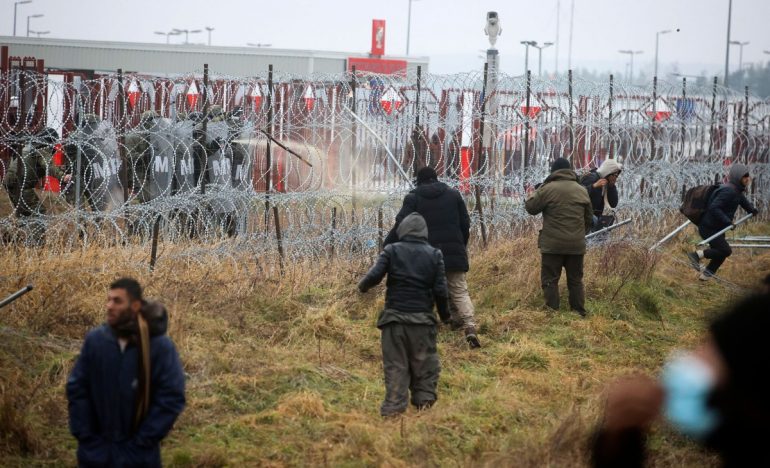On Tuesday, Polish authorities used tear gas and water cannons to disperse stone-throwing migrants attempting to enter the Belarusian border, prompting Belarus to accuse Poland of escalating the problem.
According to Polish border guards, up to 4,000 refugees are reportedly camped along the Poland-Belarus border in increasingly dangerous conditions and frigid weather.
Western nations accuse Belarus President Alexander Lukashenko of engineering the crisis, possibly with Russia’s help, by drawing migrants to the border in order to sow discord in the EU.
Hundreds of migrants congregated outside the Bruzgi-Kuznica border crossing on the EU’s eastern border last week, sparking a standoff.
The defense ministry of Poland posted a video on Twitter showing the clashes at the border on Tuesday (16 November) and said, “Migrants attacked our soldiers and officers with rocks and are trying to destroy the fence and cross into Poland.”
During the clashes, a police officer, a border guard, and a soldier were hurt, according to Polish officials, who also claimed that stun grenades and tear gas canisters were hurled at policemen.
Anataoly Glaz, a spokeswoman for Belarus’ foreign ministry, accused Poland of worsening the crisis. He said, “The goal of the Polish side is completely understandable — it needs to escalate the situation, even more, to stifle any progress in resolving the situation.”
Furthermore, he said, “We see today from the Polish side direct provocations and inhumane treatment of the disadvantaged.”
Russia also slammed Poland’s deployment of tear gas and water cannons against refugees, calling it “completely reprehensible,” according to Foreign Minister Sergei Lavrov.
Lukashenko, who has spent nearly three decades in power-crushing opposition to his regime, said on Tuesday that he wished to avoid a “heated confrontation” at the border.
Furthermore, he said, “The main thing now is to protect our country and our people, and not to allow clashes.”
On Monday, the Belarusian president spoke with Angela Merkel of Germany about the problem, his first phone call with a Western leader since he quashed huge rallies against his government last year.
According to Merkel’s office, the two discussed sending humanitarian aid to the migrants, who include many children. Lukashenko stated that he and Merkel agreed that the crisis should be resolved.
“We were all of the same opinions that escalation was unnecessary — neither the EU nor Belarus,” he said. But he added he and Merkel had “differing” views on how the refugees arrived in Belarus, with the West accusing Minsk of bringing them there as retaliation for sanctions.
Existing penalties on Lukashenko’s regime will be broadened to cover individuals or firms proven to have supported border crossings, EU foreign ministers agreed on Monday. The US has also promised to tighten sanctions against Belarus.
Svetlana Tikhanovskaya, a Belarusian opposition activist living in exile in Lithuania, applauded the penalties, saying Lukashenko had “crossed all the red lines already.”



